City Introduction
Chengdu, the capital of Sichuan province, is one of China's most vibrant and culturally rich cities. Known as the 'Land of Abundance', it has a history spanning over 2,300 years. Situated on the fertile Chengdu Plain, the city has been an important center for trade, culture, and innovation throughout Chinese history.
Today, Chengdu is celebrated for three main treasures: giant pandas, Sichuan cuisine, and its relaxed lifestyle. It's home to the world's largest panda breeding and research facility, where visitors can observe these beloved national treasures in a setting that mimics their natural habitat.
The city's food culture is renowned worldwide, with UNESCO recognizing Chengdu as a City of Gastronomy in 2010. Sichuan cuisine's bold flavors, characterized by the unique numbing and spicy 'ma la' taste, have conquered palates globally. From street food to fine dining, Chengdu offers culinary experiences that are both accessible and unforgettable.
Beyond pandas and food, Chengdu is known for its laid-back atmosphere and teahouse culture. Locals pride themselves on their quality of life, often gathering in teahouses to chat, play mahjong, or simply watch the world go by. This relaxed pace contrasts with the rapid development that has transformed Chengdu into a modern metropolis and technology hub.
The city serves as an ideal gateway to explore Sichuan's diverse attractions, from ancient irrigation systems and sacred mountains to the breathtaking scenery of western Sichuan. This three-day guide will introduce you to Chengdu's essential experiences, combining its natural wonders, cultural heritage, culinary delights, and urban charm.
3-Day Day Itinerary Overview
Day 1
Pandas and Cultural Heritage
The first day focuses on encountering Chengdu's most famous residents - the giant pandas, followed by an exploration of the city's rich historical and cultural heritage in Jinli Ancient Street and Wuhou Shrine.
Day 2
UNESCO World Heritage Day Trip
The second day takes you on a day trip to two UNESCO World Heritage Sites outside central Chengdu: the ancient Dujiangyan Irrigation System and Mount Qingcheng, a sacred Taoist mountain.
Day 3
Urban Chengdu Experience
The third day is dedicated to experiencing urban Chengdu, its relaxed lifestyle, local culture, and modern attractions, with visits to historic alleys, parks, museums, and shopping districts.
Detailed Itinerary
Day 1: Pandas and Cultural Heritage
The first day focuses on encountering Chengdu's most famous residents - the giant pandas, followed by an exploration of the city's rich historical and cultural heritage in Jinli Ancient Street and Wuhou Shrine.
07:30-10:30
Visit Chengdu Panda Base
Visit the Panda Base in the early morning when pandas are most active. Observe both adult pandas and cubs in different enclosures, visit the research center, and learn about conservation efforts.
10:30-11:30
Transportation
Take a bus or taxi to Jinli Ancient Street (about 40 minutes)
11:30-14:00
Jinli Ancient Street Exploration and Lunch
Walk through the historic street, sample various Sichuan snacks for lunch, watch cultural performances, and shop for souvenirs.
14:00-14:15
Transportation
Walk to Wuhou Shrine (adjacent to Jinli Street)
14:15-16:30
Wuhou Shrine Visit
Explore the ancient shrine dedicated to Zhuge Liang, learn about Three Kingdoms history, and enjoy the peaceful garden setting.
16:30-19:30
Dinner and Evening Activities
Return to Jinli Street for dinner and evening activities, experiencing the street's beautiful night atmosphere with illuminated lanterns.
Day 2: UNESCO World Heritage Day Trip
The second day takes you on a day trip to two UNESCO World Heritage Sites outside central Chengdu: the ancient Dujiangyan Irrigation System and Mount Qingcheng, a sacred Taoist mountain.
08:00-09:30
Transportation to Dujiangyan
Take a high-speed train or tour bus to Dujiangyan (about 1-1.5 hours from Chengdu)
09:30-12:30
Dujiangyan Irrigation System Tour
Explore this ancient engineering marvel, walk across the Anlan Suspension Bridge, and visit key components of the irrigation system including Yuzui, Feishayan, and Baopingkou.
12:30-13:30
Lunch
Enjoy lunch at a local restaurant near Dujiangyan, trying regional specialties.
13:30-14:00
Transportation
Take a short bus ride to Mount Qingcheng (about 20 minutes)
14:00-17:30
Mount Qingcheng Exploration
Visit the front mountain area of Mount Qingcheng, taking a cable car up (optional) and exploring Taoist temples including Jianfu Palace and Shangqing Palace. Enjoy the beautiful natural scenery and peaceful atmosphere.
17:30-19:00
Return to Chengdu
Take a bus or train back to Chengdu city center.
19:00-21:00
Sichuan Opera Performance (Optional)
Attend a traditional Sichuan Opera performance featuring face-changing, fire-spitting, and other unique cultural arts.
Day 3: Urban Chengdu Experience
The third day is dedicated to experiencing urban Chengdu, its relaxed lifestyle, local culture, and modern attractions, with visits to historic alleys, parks, museums, and shopping districts.
09:00-12:00
Kuanzhai Alley Exploration
Visit the three famous alleys (Wide, Narrow, and Well), experience traditional Chengdu culture, try local tea houses, and enjoy the unique mix of traditional and modern elements.
12:00-13:30
Lunch in Kuanzhai Alley
Have lunch at one of the traditional restaurants in the alley, trying authentic Sichuan dishes.
13:30-14:00
Transportation
Walk or take a short taxi ride to People's Park (about 15 minutes)
14:00-15:30
People's Park Visit
Experience local lifestyle in the park, visit a traditional teahouse, watch locals practicing various activities, and optionally try the famous ear cleaning service.
15:30-16:00
Transportation
Walk to Sichuan Museum (about 15 minutes)
16:00-17:30
Sichuan Museum Tour
Learn about Sichuan's rich history and cultural heritage through various exhibitions, with special attention to the ancient Shu civilization artifacts.
17:30-18:00
Transportation
Take a short taxi ride to Chunxi Road (about 15 minutes)
18:00-21:00
Chunxi Road Shopping and Dinner
Experience Chengdu's modern urban life through shopping, dining, and entertainment at this bustling commercial district. Enjoy your final dinner in Chengdu at one of the many restaurants.
Attraction Details
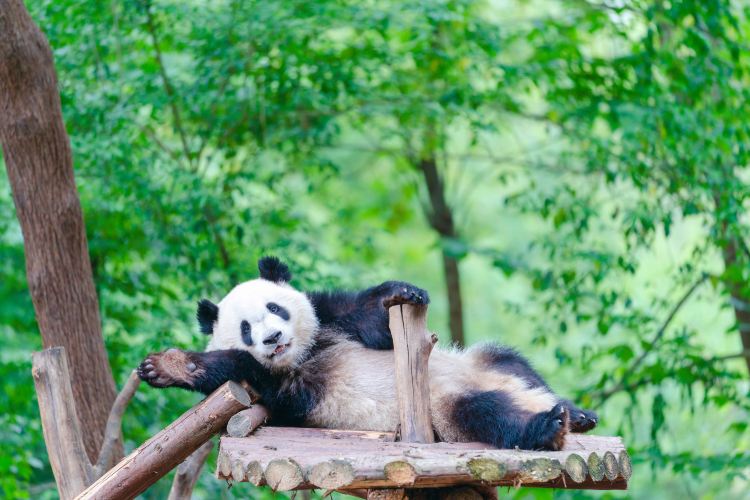
Chengdu Research Base of Giant Panda Breeding
A world-renowned panda conservation and research facility where visitors can observe pandas in a setting that resembles their natural habitat. Home to over 80 pandas, the base offers a unique opportunity to watch these endangered animals eat, play and interact. The best time to visit is in the morning when pandas are most active.
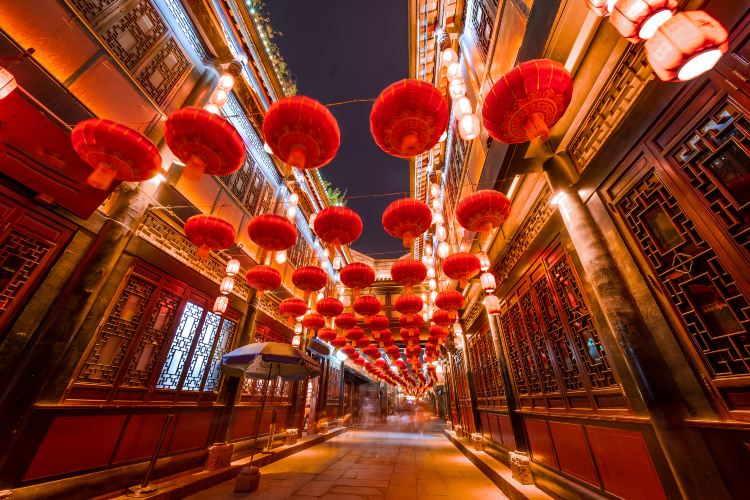
Jinli Ancient Street
One of the oldest commercial streets in Sichuan, with a history dating back to the Three Kingdoms Period. The street combines traditional Sichuan architecture with modern commercial elements, offering various local snacks, handicrafts, and cultural performances. It's particularly beautiful in the evening when the red lanterns are lit.
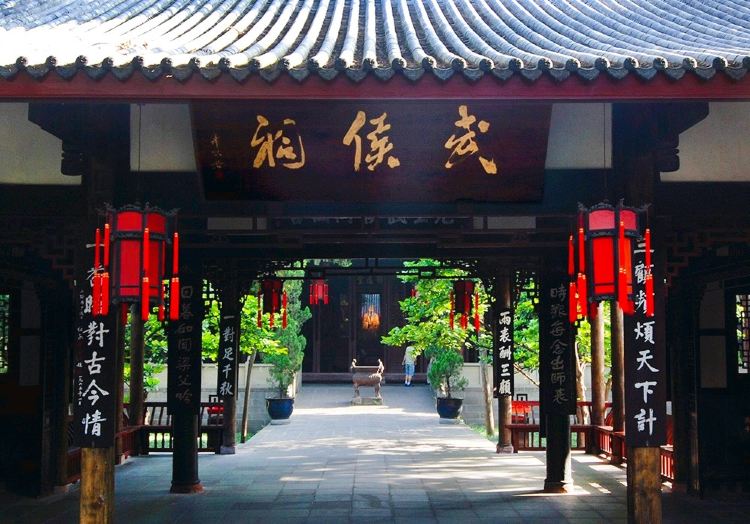
Wuhou Shrine
A memorial temple dedicated to Zhuge Liang, the renowned strategist during the Three Kingdoms period. The shrine complex includes the Temple of Marquis Wu, the Hall of Liu Bei, and a serene bamboo grove. It houses numerous historical relics and is known for its peaceful atmosphere and beautiful gardens.
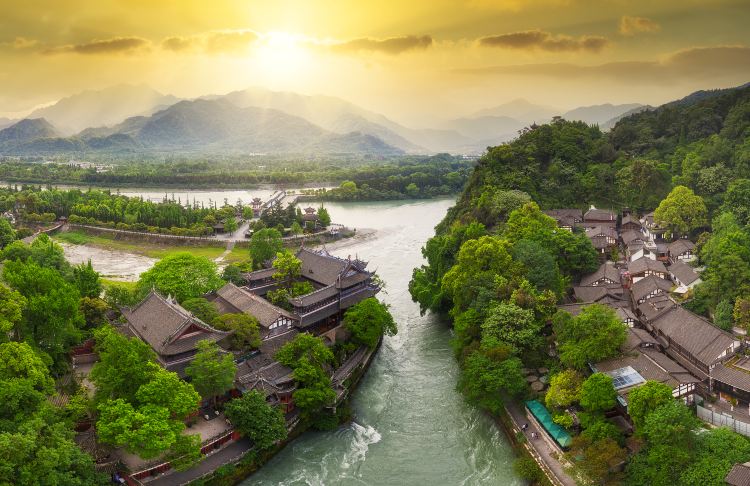
Dujiangyan Irrigation System
A UNESCO World Heritage Site and the oldest irrigation system still in use in the world. Built in 256 BC, this engineering marvel diverts water from the Min River to farmlands without the use of dams. The site includes the Yuzui (Fish Mouth) Levee, Feishayan (Flying Sand Weir), and Baopingkou (Bottle-Neck Channel).
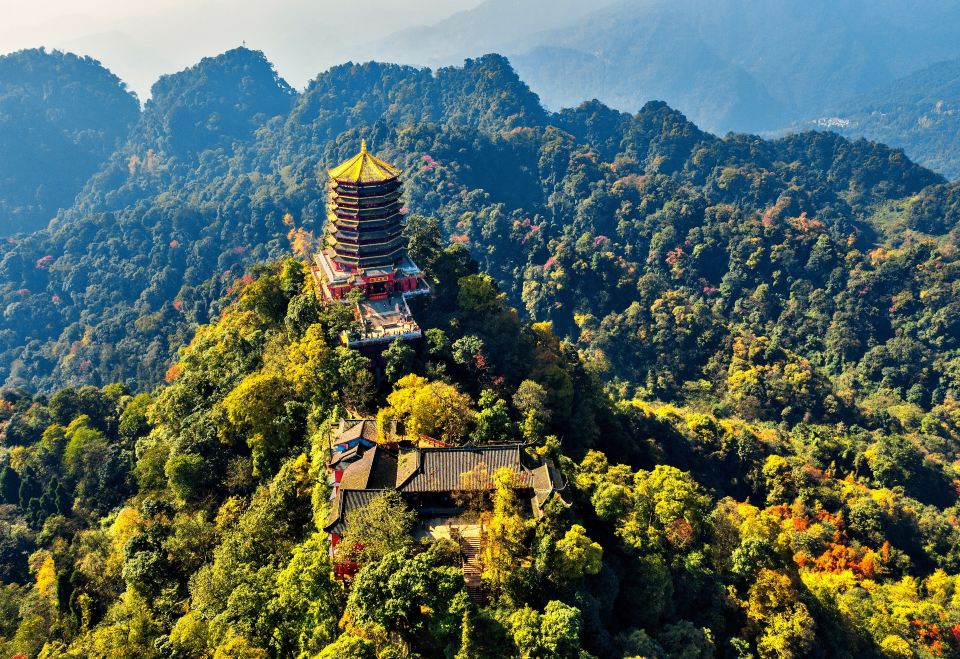
Mount Qingcheng
One of the birthplaces of Taoism in China and a UNESCO World Heritage Site. Known for its lush greenery, ancient temples, and serene atmosphere. The mountain is divided into front and back sections, with the front mountain being more developed and accessible, featuring historic sites like Jianfu Palace and Shangqing Palace.
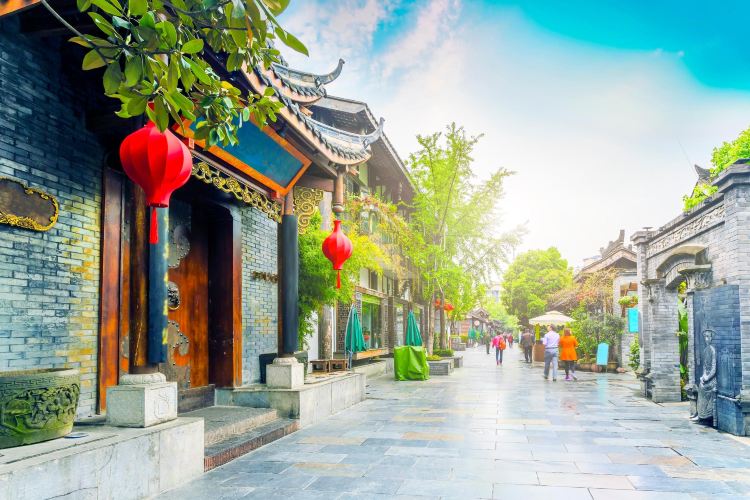
Kuanzhai Alley
Consists of three parallel ancient alleys: Kuan Alley (Wide Alley), Zhai Alley (Narrow Alley), and Jing Alley (Well Alley). This area preserves old Chengdu's architectural style while incorporating modern elements. It features teahouses, restaurants, boutique shops, and art galleries, making it a perfect place to experience traditional Chengdu lifestyle.
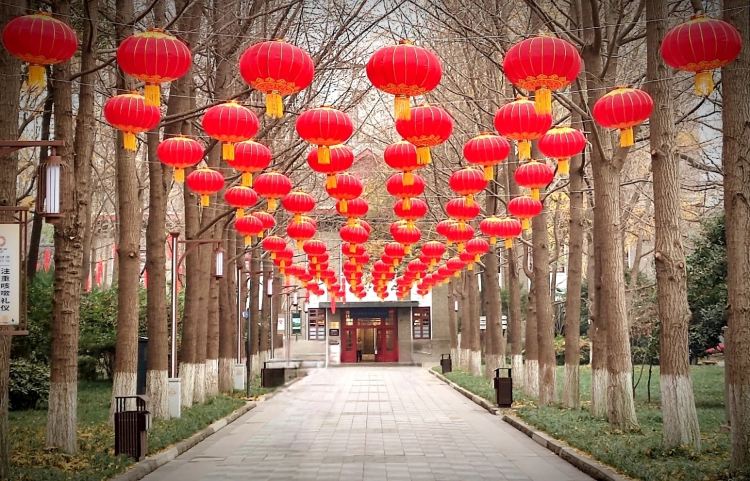
Chengdu People's Park
A popular urban park in the heart of Chengdu where locals gather for various activities. Visitors can enjoy boating on the lake, watching locals practice Tai Chi, singing, or dancing. The park's teahouse is famous for ear cleaning services and traditional tea culture experiences.
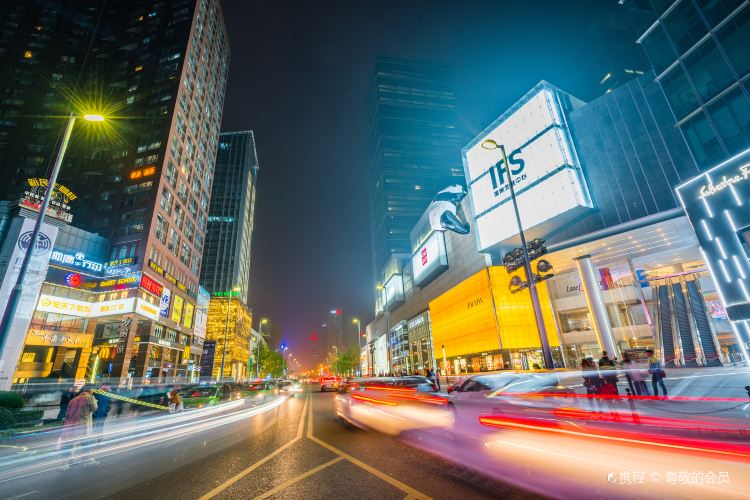
Chunxi Road Shopping District
The busiest commercial pedestrian street in Chengdu, offering a comprehensive shopping experience with a mix of international brands, local specialties, and delicious food options. The area is particularly vibrant in the evening with bright neon lights and bustling crowds.
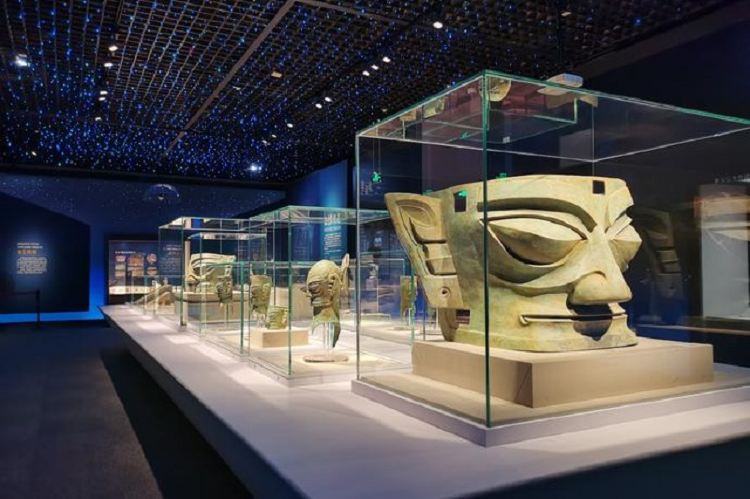
Sichuan Museum
A comprehensive museum showcasing Sichuan's rich history and culture. The collection includes ancient Shu civilization artifacts, bronze items, pottery, calligraphy, paintings, and ethnic minority cultural relics. A highlight is the exhibition on the ancient Sanxingdui and Jinsha civilizations.
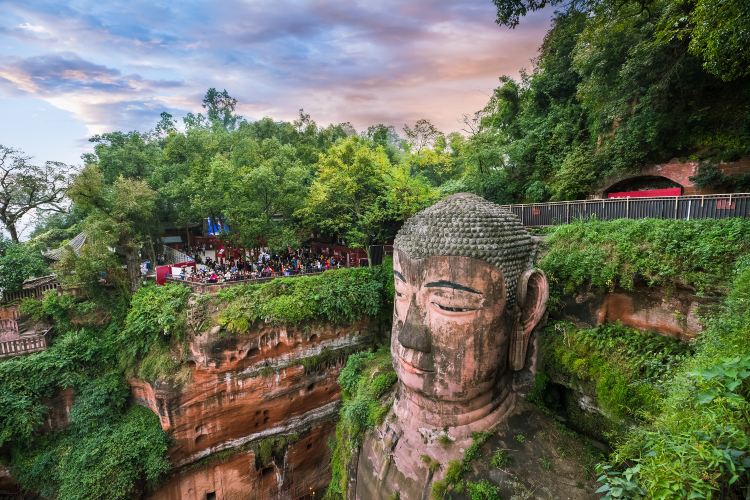
Leshan Giant Buddha
The largest stone Buddha statue in the world, carved into the cliff face of Lingyun Mountain. Standing 71 meters tall, the Buddha overlooks the confluence of three rivers. This UNESCO World Heritage Site was built during the Tang Dynasty and took 90 years to complete. Visitors can climb down the stairs to view the Buddha from different angles.
Local Specialty Foods
Hotpot
Chengdu's signature dish featuring a spicy, numbing broth in which various ingredients like meat, vegetables, and tofu are cooked at the table. The authentic Chengdu hotpot uses a red oil base with numerous spices.
Huangcheng Laoma, Shizilou, Da Miao Hotpot
Mapo Tofu
Soft tofu in a spicy sauce made with fermented broad bean paste, chili oil, and Sichuan peppercorns, creating the famous 'ma la' (numbing and spicy) flavor.
Chen Mapo Tofu, Baguo Buyi
Dan Dan Noodles
A spicy Sichuan noodle dish topped with preserved vegetables, chili oil, Sichuan peppercorns, minced pork, and scallions.
Long Chao Shou, Chengdu Snack Street in Jinli
Kung Pao Chicken
Diced chicken stir-fried with peanuts, vegetables, and chili peppers in a tangy sauce, creating a perfect balance of sweet, sour, and spicy flavors.
Baguo Buyi, Chengdu Restaurants in Kuanzhai Alley
Twice-Cooked Pork
Pork belly first boiled, then sliced and stir-fried with vegetables and spicy bean paste, creating a dish with rich flavors and varied textures.
Chengdu Restaurants in Kuanzhai Alley
Zhong Dumplings
Boiled dumplings served with a special sauce made of chili oil, soy sauce, vinegar, garlic, and sugar, topped with minced garlic and green onions.
Long Chao Shou, Zhong Dumpling in Chunxi Road
Rabbit Head
A popular Chengdu street food where rabbit heads are marinated in a complex spice mix and then slow-cooked until tender.
Jixiang Rabbit Head, various stalls in Jinli Street
Sweet Water Noodles
Cold noodles dressed with a sweet and spicy sauce, usually made with chili oil, garlic, soy sauce, and sugar, then topped with crushed peanuts.
Chunxi Road food courts, Jinli Street
Practical Tips
Best Time to Visit
Spring (March-May) and autumn (September-November) are the best seasons to visit Chengdu, with pleasant temperatures and less rain. Summer can be hot and humid, while winter is mild but often overcast and foggy.
Transportation Suggestions
Chengdu has an efficient metro system that connects major attractions. For places outside the metro network, taxis are affordable. For day trips to Dujiangyan and Mount Qingcheng, high-speed trains from Chengdu North Railway Station are convenient.
Accommodation Recommendations
For convenience, stay in the city center near Chunxi Road or Tianfu Square. Budget travelers can find hostels in Wuhou District near Jinli, while luxury options are available around Chunxi Road and the Financial Center area.
Spice Level Advisory
Sichuan cuisine is famously spicy. If you have low spice tolerance, be sure to specify 'less spicy' (微辣, wēi là) or 'not spicy' (不辣, bù là) when ordering. Most restaurants can adjust spice levels for tourists.
Panda Base Visit Tips
Visit the Panda Base early in the morning (before 10 AM) when pandas are most active. Avoid weekends and Chinese holidays if possible, as it can get extremely crowded.
Teahouse Culture
Experiencing a traditional teahouse is a must in Chengdu. People's Park and Kuanzhai Alley have authentic teahouses where you can spend hours sipping tea and watching locals socialize, play mahjong, or perform ear cleaning.
Weather Preparedness
Chengdu is known for its humid climate and occasional rain. Always carry an umbrella or light raincoat, even if the forecast doesn't call for rain.
Conclusion
Three days in Chengdu offers just a glimpse of what this fascinating city has to offer. From the adorable pandas that have become global ambassadors for wildlife conservation to the ancient engineering marvel of Dujiangyan, from spicy hotpot that numbs your tongue to the serene teahouses where time seems to stand still, Chengdu presents a perfect blend of nature, history, culture, and modernity.
This itinerary balances the must-see attractions with authentic local experiences, allowing you to appreciate both the traditional and contemporary aspects of Chengdu. The city's renowned hospitality, expressed in the local saying 'The hardest thing to do in Chengdu is to leave', makes visitors feel instantly at home.
If you have more time, consider extending your stay to explore nearby attractions like the Leshan Giant Buddha or the stunning Jiuzhaigou National Park. Alternatively, spend extra days in Chengdu itself, diving deeper into its food scene, traditional crafts, or modern developments.
Whether you're a food enthusiast, a culture seeker, a nature lover, or simply looking for a place where you can experience the authentic rhythm of Chinese urban life, Chengdu will not disappoint. The city's unique character, formed by its geographical location, historical significance, and cultural traditions, continues to captivate travelers from around the world.
Itinerary Highlights Summary
- 1Meet the adorable giant pandas in their hometown at the Chengdu Panda Base
- 2Experience the perfect blend of history and modernity in Kuanzhai Alley and Jinli Ancient Street
- 3Marvel at the 2,200-year-old Dujiangyan Irrigation System, a testament to ancient Chinese engineering
- 4Indulge in authentic Sichuan cuisine, from street food to traditional hotpot
- 5Experience Chengdu's famous relaxed lifestyle and teahouse culture in People's Park
- 6Explore the sacred Taoist mountain of Qingcheng with its peaceful temples and natural beauty